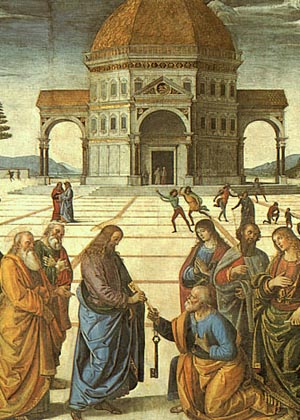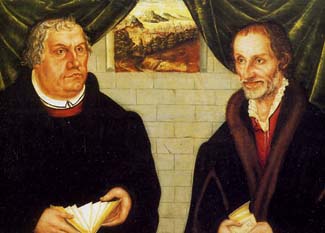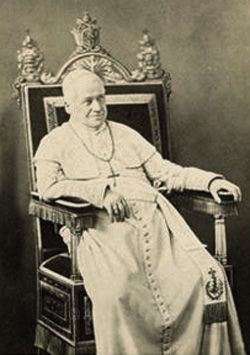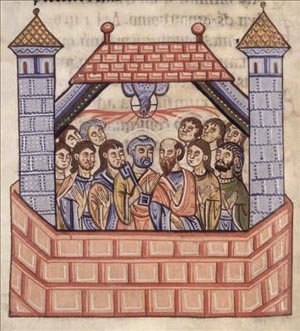 |
A Column of Catholic Orientation
Please, Don’t Call Protestants Christians
Marian T. Horvat, Ph.D.
It is very common today to hear Catholics call a Protestant “a Christian,” or even, “a good Christian.” In the United States, it was already a practice before Vatican II because of the tendency of American Catholics to accommodate Protestantism, whose tonus dominated the social and business spheres. Then, there was the question of adaptation as prominent Protestants joined the Catholic faith, or Catholics entered into marriages with Protestants. It was just easier to call everyone “Christian.” Supposedly it underplayed differences. It was meant to create the impression that Catholics and Protestants were cousins in one big, happy family. Pope Leo XIII condemned this tolerance toward Protestantism under the name of Americanism, the heresy of Americanism, to be more precise.

Our Lord delivers the keys of His Church to St. Peter
Pietro Perugino, 15th century, Sistine Chapel |
After Vatican II, needless to say, the practice of calling Protestants Christians has snowballed, with the official conciliar documents assuming this same impropriety. Hence, the Holy See, Prelates and priests have made its use as widespread as possible. Accommodation to Protestantism in our days has reached such a point that some Catholics, to distinguish between Catholics and their Protestant “separated brethren,” call themselves Catholic Christians. A redundancy if I've ever heard one. Only Catholics can be true Christians. No one who dissents from the Roman Catholic Church can be a Christian. The terms are synonymous.
Every time I hear the term Christian used for Protestants, I cringe. Its usage clearly nourishes a trend toward a dangerous religious indifferentism, which denies the duty of man to worship God by believing and practicing the one true Catholic Religion. It is an implicit admission that those who deny the one Faith can nonetheless be Christians, that is, be in the Church of Christ. Inherently it leads to the progressivist notion that men can be saved in any religion that accepts Christ as Savior. A “good Lutheran,” a “good Anglican,” a “good Presbyterian – what does it matter so long as they are good people and sincerely love Christ?
Regardless of who is applying this usage today, I want to stress that it is at variance with the entire tradition of the Catholic Church until the Council. To consider heretics as Christians is not the teaching of the Church.
Before Vatican II, the Magisterium was always very clear: It is not a matter of an individual’s character or traits. No one can be in the Church of Christ without professing the ensemble of the truths of Catholic Faith, being in unity with the Chair of Peter and receiving the same Seven Sacraments. The only Christian is one who accepts Our Lord Jesus Christ and the Church he established. Who can have God for Father and not accept the Church for Mother? (Pope Pius IX, Singulari quidem of March 17, 1856) Who can accept the spouse Christ, and not his mystical bride the Church? Who can separate the Head, the only begotten Son of God, from the body, which is His Church? (Pope Leo XIII, Satis cognitum of June 29, 1896). It is not possible.
In short, only those who profess the one Catholic Faith and are united with the Mystical Body of Christ are members of the Church of Christ. And only those members can legitimately bear the title of honor of Christian.
The Protestant sect started as a revolt, protesting the Church of Christ and, pretending to accept Christ without Peter, the authority He established on earth. With this split, they left the Church and became heretics. This used to be clearly said and understood, without sentimental fear of offending one’s neighbors or relatives: A Protestant is a heretic because he severed himself from the Body of the Church. He is not a Christian, and certainly not a “good Christian.”
Scriptures confirm this truth
My friend Jan thought I was being too severe on this topic. “You’re making a mountain out of a molehill,” she said. “Don’t Scriptures teach us to love our neighbor and not be judgmental?”
It is the same old post Vatican II story, claiming that it is “judgmental” to correct bad practices and false teachings and arguing with disputable interpretations of Scriptures.

Luther and Melanchthon broke with the Church of Christ
Lucas Cranach the Younger |
Well, despite these subjective interpretations, the inspired words of Scriptures provide an unambiguous defense that the custody of the vineyard has been committed by Christ to the Catholic Church alone. Let me quote just a few verses:
- “He who hears you (Peter) hears me, and he who rejects you, rejects me, and he who rejects me, rejects him who sent me (Lk 10:16).” It could not be clearer: the Protestant who rejects the head, rejects Christ himself, and should not be granted the name Christian.
- Christ establishes one Church with a single head: “And I will give unto thee the keys of the kingdom of heaven: and whatsoever thou shalt bind on earth shall be bound in heaven: and whatsoever thou shalt loose on earth shall be loosed in heaven” (Matt 16:19).
- St. Paul is severe in his condemnation of false teachers, e.g. Protestants: “If any man preaches any other Gospel unto you than that ye have received, let him be accursed” (Gal 1: 9).
- In another passage he instructs Catholics to remove themselves from the bad society of non-Catholics: “And we charge you, brethren, in the name of Our Lord Jesus Christ that you withdraw yourselves from every brother walking disorderly and not according to the Tradition which they have received of us” (2 Thess 3:6).
- The Apostle St. John forbade any intercourse with heretics: “If any man come to you and bring not this doctrine, receive him not into the house or welcome him” (2 Jo 1:10)”
Holy Scriptures are clear on the point that only those who belong to the one Church founded by Christ, the Catholic Church, can rightfully be considered Christians.
Popes reiterate this teaching
The traditional Papal Magisterium was also clear on this topic. Let me offer a few texts by way of exemplification.

Pius IX: “He who abandons the Chair of Peter is falsely persuaded that he is in the Church of Christ” |
Pius XII stated unequivocally: “To be Christian one must be Roman. One must recognize the oneness of Christ’s Church that is governed by one successor of the Prince of the Apostles who is the Bishop of Rome, Christ’s Vicar on earth” (Allocution to the Irish pilgrims of October 8, 1957). How is it possible to be clearer than this about those who can be called Christian?
Leo XIII makes it plain that separated members cannot belong to the same body: “So long as the member was on the body, it lived; separated, it lost its life. Thus the man, so long as he lives on the body of the [Catholic] Church, he is a Christian; separated from her, he becomes a heretic” (Encyclical Satis cognitum of June 29, 1896).
Emphasizing the fate of those who break away from the one Faith, he says: “Whoever leaves her [the Catholic Church] departs from the will and command of Our Lord Jesus Christ; leaving the path of salvation, he enters that of perdition. Whoever is separated from the Church is united to an adulteress” (ibid.). Certainly, they do not share with us the same title of Christian.
Pope Pius IX stated: “He who abandons the Chair of Peter on which the Church is founded, is falsely persuaded that he is in the Church of Christ” (Quartus supra of January 6 1873, n. 8).
In the Syllabus of Modern Errors, the proposition that Protestantism is nothing more than another form of the same true Christian religion was specifically condemned (Pius IX, n. 18)(1).
Therefore, there is only one Christian Church, the Catholic Church, and only those who belong to it should rightfully be called Christians.

Only inside the Catholic Church can true union be achieved
Ottenbeueren Collectarius, 12th century |
How to fight Americanism?
Many persons ask me: What can I do to fight Progressivism? Others have requested: Give me some specific examples of how I can combat Americanism.
Let me offer one concrete way to fight in yourself the tendency toward accommodation with Protestantism.
When you catch yourself calling a Protestant a “Christian,” stop and correct yourself. Call him a Protestant. It is a way to affirm that you do not accept the Protestant errors and that you acknowledge it for the terrible thing it is: Protestants denied many Catholic dogmas and for this reason caused that first major crack in the unity of the Catholic Church that caused untold damage to Christendom and the perdition of those souls adhering to it.
It is a small thing, but by such small customs we as a people have been walking steadily toward religious indifferentism. It is time to set some roadblocks on that path. We should not veil in ambiguous terms our love for the ensemble of the Catholic Faith. The only true union possible for Catholics with Protestants is by their return to the one true Church of Christ, the Catholic Church. Only with such a return can they rightfully call themselves Christians.
1. Numerous traditional Catholic teachings on the this topic can be found in Atila S. Guimarães, Aniums Delendi II, Los Angeles: TIA, 2002, pp. 205-217. See also “Christian Ecuemnism” in Simon Galloway, No Crisis in the Church? New Olive Press, 2006, pp. 1-51.

Posted on February 6, 2007

Related Topics of Interest
 The Lutheran and Calvinist Mentalities The Lutheran and Calvinist Mentalities
 Ratzinger Gives Communion to Brother Schutz Ratzinger Gives Communion to Brother Schutz
 Schultz did not Convert from Protestantism Schultz did not Convert from Protestantism
 Paul VI Posing with Protestants Who Help Write the New Mass Paul VI Posing with Protestants Who Help Write the New Mass
 John Paul II Kisses the Hand of Rowan Williams, Head of the Anglican Sect John Paul II Kisses the Hand of Rowan Williams, Head of the Anglican Sect
 Bill Clinton Receives Communion Bill Clinton Receives Communion
 Benedict Preaching “Communicatio in Sacris” Benedict Preaching “Communicatio in Sacris”
 Inadmissible Concessions, Once Again Inadmissible Concessions, Once Again
 |
Related Works of Interest
|
Talks with Jan | Religious | Home | Books | CDs | Search | Contact Us | Donate

© 2002-
Tradition in Action, Inc. All Rights Reserved
|
 |
|